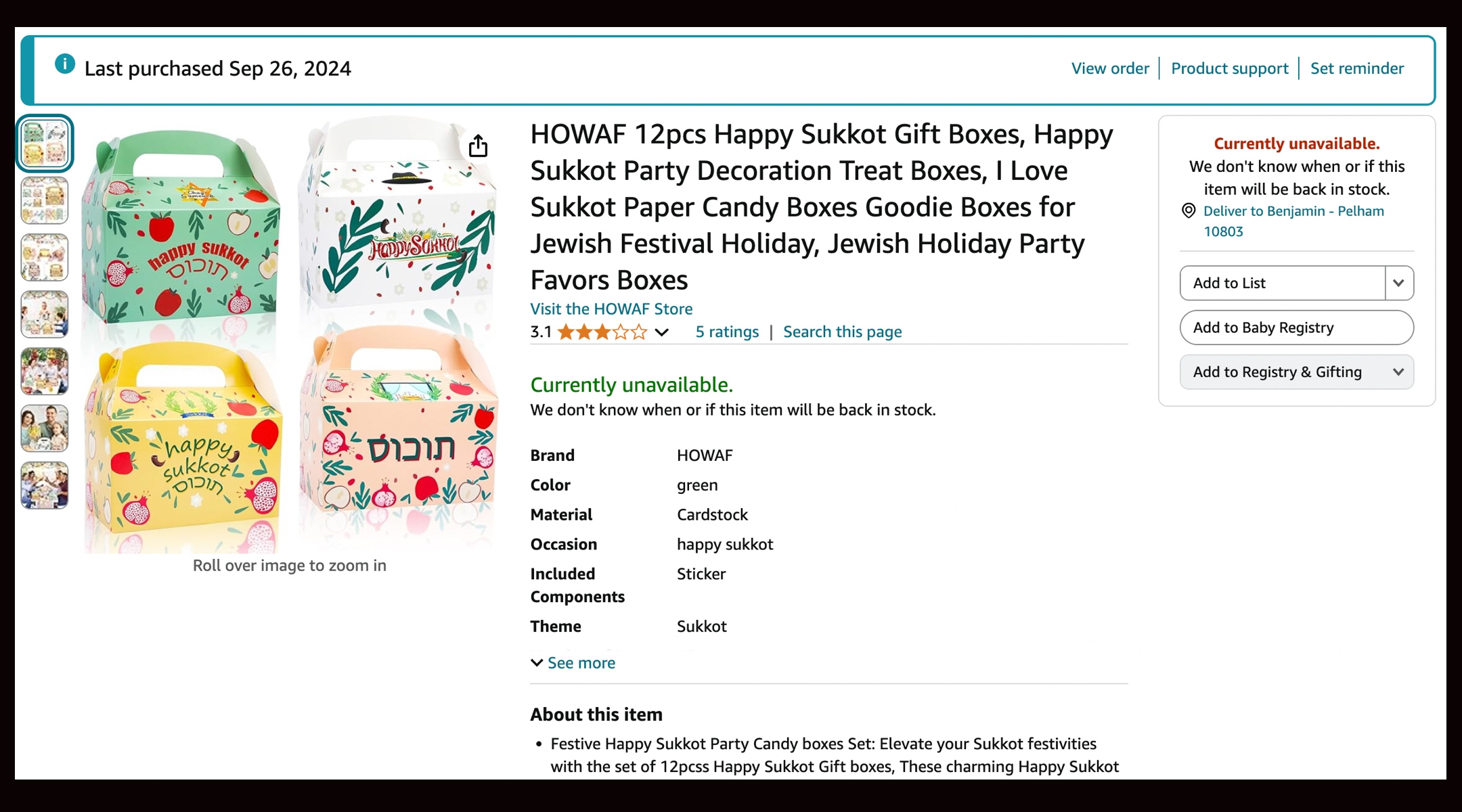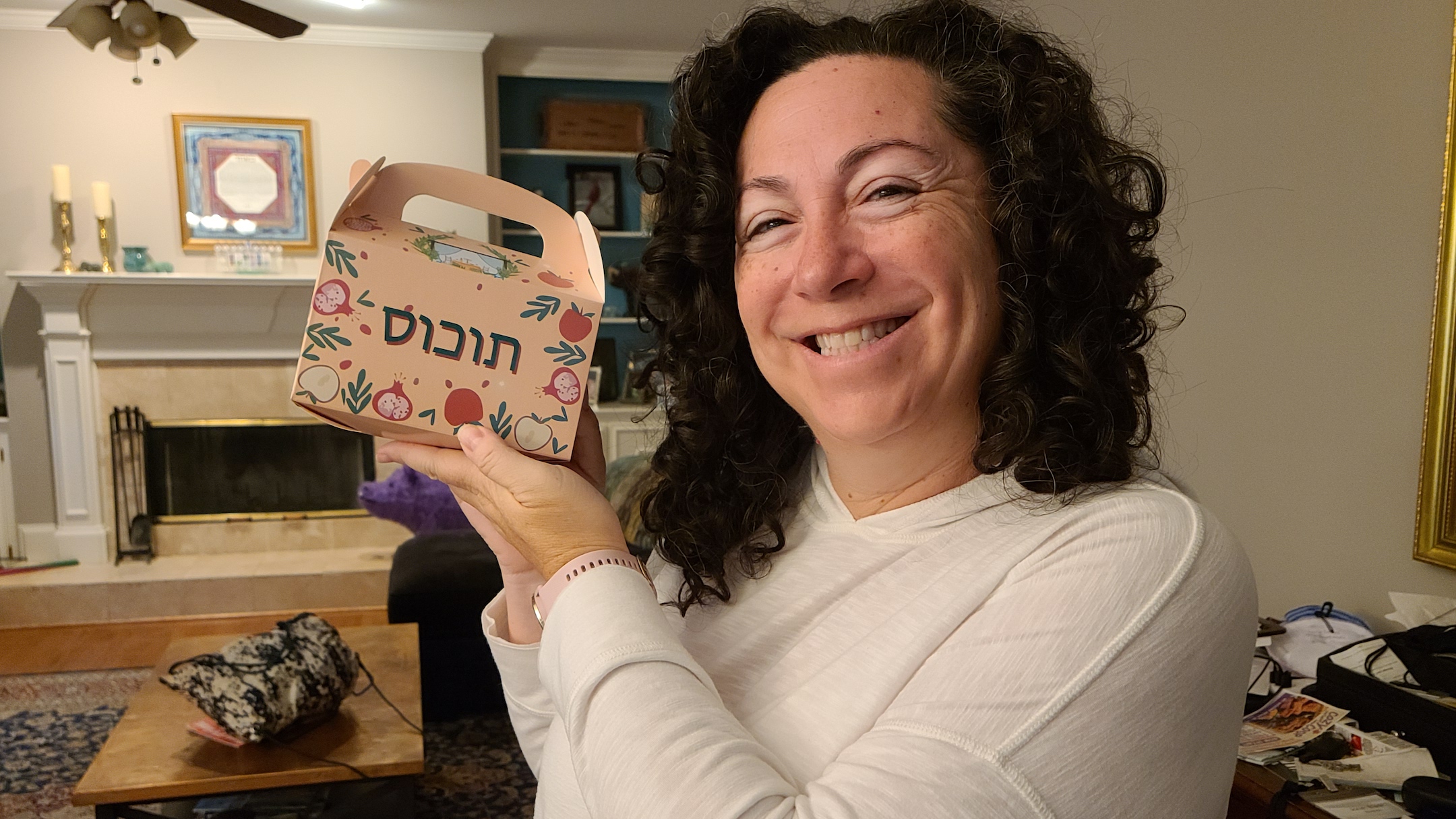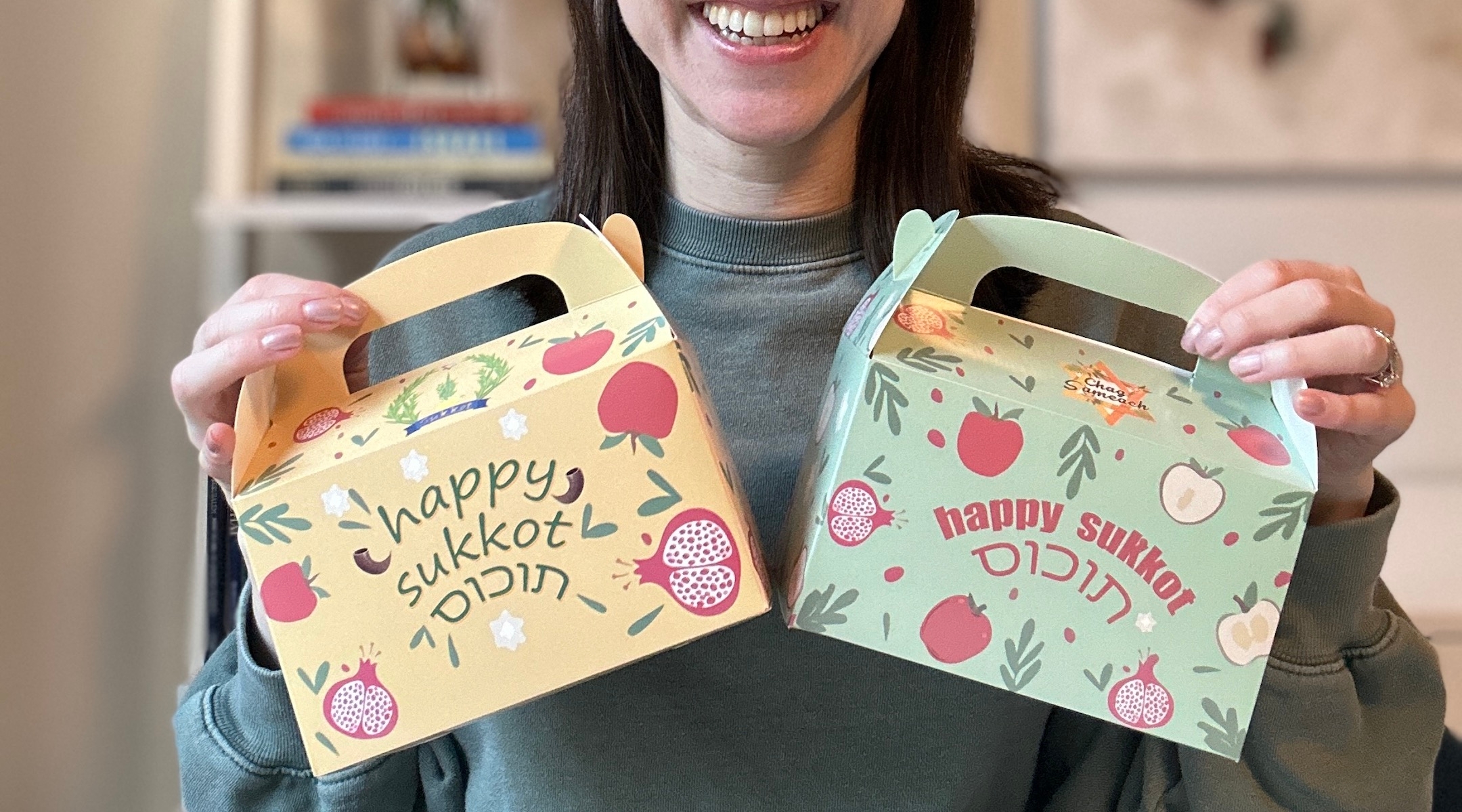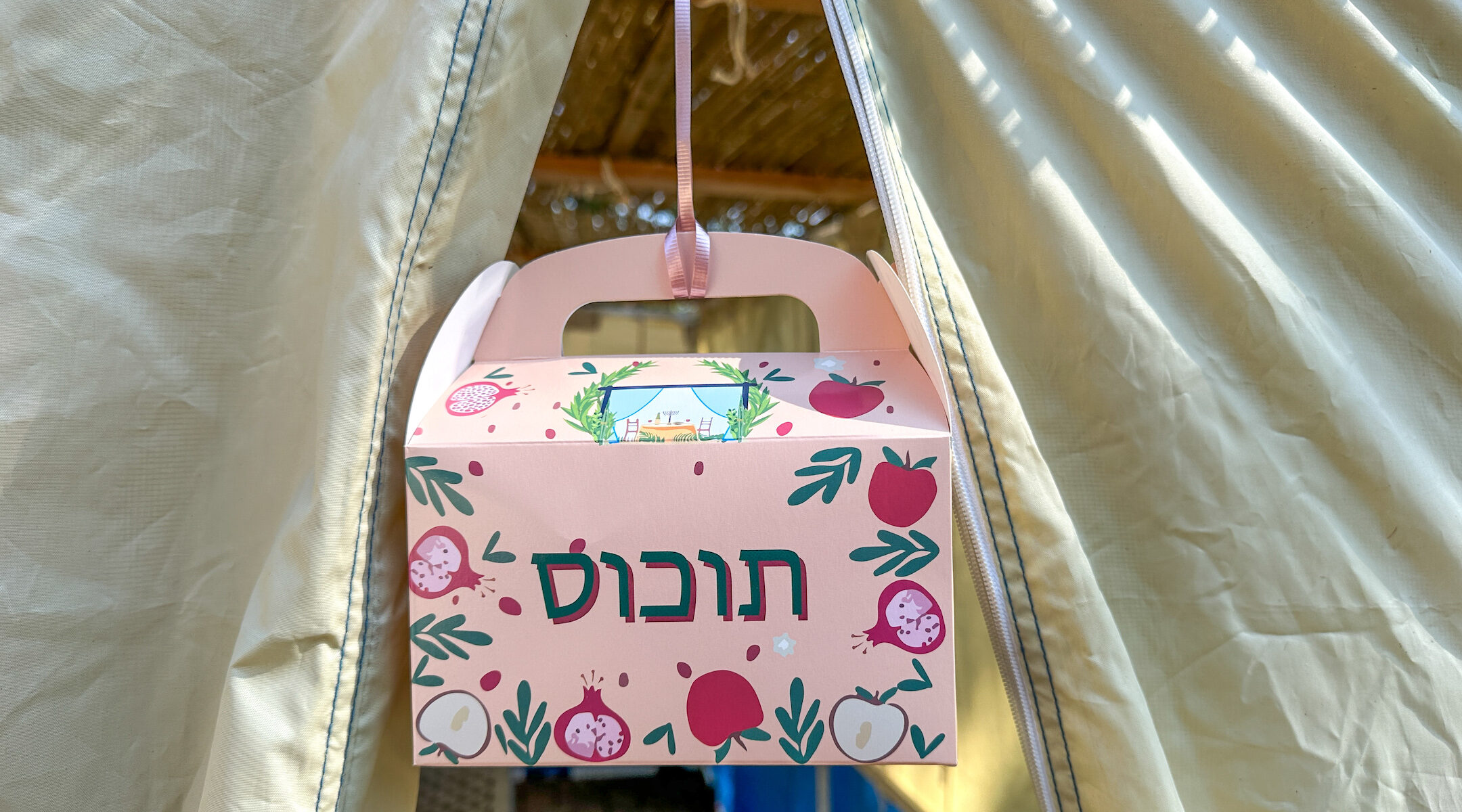The brightly colored “Sukkot boxes” offered up on Amazon boasted the colors of spring, not fall; had no ostensible use for the Jewish holiday; and contained a Hebrew misspelling that bordered on obscene.
Reader, I bought them.
And it wasn’t just me. Enabled by our Prime accounts, Jews across the United States shelled out about $15 for a dozen ready-to-construct cardboard boxes emblazoned with Hebrew letters that spelled out a phonetic variation on “tuchus” — the Yiddish word meaning “butt.”
“It was a bit of an impulse buy, but I thought it was hilarious,” said Erin Stern of Baltimore, who said she definitely would not have purchased the product had it spelled “Sukkot” correctly. “My husband thinks I’m crazy.”
Stern, like many others who clicked “buy,” made the purchase after seeing the product — with its botched Hebrew and incongruous iconography that included, for some reason, a man’s black hat — mocked on social media.
“Amazon creator who clearly doesn’t speak Hebrew,” Yaakov Langer, a prominent Jewish digital creator, tweeted in late September along with the laughing-until-crying emoji and two product photos showing the boxes — one imposed onto a scene of a family lighting a Hanukkah menorah, the other onto an image of a family at a Passover seder table.
He added, “Wishing you and your family a Happy & Healthy Tuchus.”
For anyone who has tried copying and pasting Hebrew into an English-language document, the source of the error is obvious: Many apps will flip the order of the Hebrew letters. The phonetic spelling of “tuchus” on the boxes is an accurate spelling of Sukkot, but in reverse.
In Atlanta, Heather Blank is using the boxes to deliver treats to fellow members of her synagogue who helped High Holiday services go off without a hitch while their rabbi is on family leave.
“I just thought they were hysterical,” Blank, a past president of congregation Or Hadash, told me. But she noted that they crumpled when she tried to include apple-scented candles and juice boxes.
“The first one I put together, I picked it up by the handles, and the whole bottom just fell right apart,” she said. “So, yeah, they are not intended to hold much weight.”
Metaphorical challenge accepted. I set out to get answers to some pretty big questions: What does it mean about contemporary Judaism and capitalism that these boxes were available? And what does it mean about contemporary Jews that we bought them?

The receipts, as they say. (Screenshot from Amazon)
I reached out to Rabbi Yael Buechler, a self-appointed watchdog of mass-market Judaica, to hear what she thought. She told me she’d purchased the boxes herself after posting on social media about them.
“I think I needed to see if it was real,” she said. “Sometimes there are product images that are sort of warped online. And I just wanted to know if this was really the case, that a product could be out there spelled completely backwards.”
Buechler noted that Hebrew letters are routinely mangled by mass merchandisers. She recently succeeded in getting the home-decor store West Elm to remove a Hanukkah garland featuring felt dreidels with inaccurate letters. “It’s not just limited to Amazon,” she said. “But it’s certainly more frequent that Amazon would have product listings with errors, because it lists everything.”
Blank said she suspected that someone with no knowledge of Jews or Judaism had noticed an uptick in sales of premade boxes before Purim, the Jewish holiday that includes deliveries of food treats, and tried to replicate that for the fall.
“I feel like someone has made a connection: Somewhere, some data said, ‘Oh, we sold a lot of these. Let’s sell them for the other holidays, too,’” she said. “I don’t think there’s any thought at all in this particular product as to, oh, yes, this is us letting the Jews have more products or feel more represented. I think this is: Let us sell more things.”

Heather Blank of Atlanta shows off the “Tuchus” box she bought on Amazon to deliver Sukkot gifts to fellow members of her synagogue. (Courtesy Heather Blank)
Stern said she had mixed feelings imagining how her Sukkot boxes came to be. “It shows that we are really such a minority, that there is no one that is able to oversee the mass marketing of these types of vendors, and to ensure that Judaica goods are properly put out into the world,” she said. But when it comes to representations of Jewish culture on the mass market, she added, “I think something is better than nothing. … Somebody somewhere is trying, and now we just need to kind of refine it.”
Clarification about the Sukkot boxes’ origin story, or their prospects for improvement, would not come from Howaf, the Amazon seller from which I bought mine. The storefront, one of an increasing number with nonsensical names slinging a wide range of unrelated products, shares no contact information. The Sukkot boxes are no longer available from Howaf, which sells paper goods and decor for dozens of occasions, but many identical products are available from vendors with names such as JZXUAO, Orxiery and ABTOLS. None of them indicated a way to be contacted, either.
The purveyors are all part of the flood of “pseudo-brands” that all contributed to Amazon’s $30 billion in profits last year. According to a 2020 New York Times investigation, copycat sellers are usually single Chinese manufacturers who use multiple invented names to exploit Amazon’s sales algorithms while complying with U.S. trademark laws. Rather than offer a brand promise of their own, they exist only to wrest value out of the customers that Amazon has captured. As one company representative told the Times, “We sell the products that are popular on Amazon.”
The proliferation of Potemkin vendors on Amazon’s marketplace embodies what the cultural commentator Cory Doctorow has described as “enshittification.” (Doctorow, who is Jewish, said he was not qualified to comment on the Sukkot boxes when I reached out through his seemingly named-to-shame website, Craphound.) According to Doctorow, all platforms go through a cycle in which they first deliver value to users and then to creators before turning to the inevitable goal of all corporations, delivering value to shareholders. The result, he writes: “The platform becomes a useless pile of shit.”
For Buechler, the cycle has consequences beyond producing gag gifts. She sells Jewish holiday pajamas and other products through her company Midrash Manicures — and is skeptical of Amazon. “Amazon is not a place where small businesses can thrive,” she said.
For most of us, though, the result is easily available, if low-quality and environmentally costly, products to meet every need — including ones we didn’t know we had. And when we buy them, we make our own incremental contributions to a marketplace that is unlikely to give us culturally competent stuff in the future.

For Rabbi Yael Buechler, Amazon’s “Happy Tuchus” Sukkot boxes were the Jewish joy we needed this year. (Courtesy Buechler)
Most of us know this, on some level. But sometimes we simply cannot resist.
Shoshana Gottlieb, a Jewish educator in Australia who has gained a wide audience on her account Jewish Memes Only, was so enamored of the Sukkot boxes that she asked a friend in the United States to mail them to her. They arrived just before the holiday.
“Easy answer is because they’re really funny,” Gottlieb said via Instagram DM as to why she had gone the extra 10,000 miles to procure her own boxes.
She had a more substantive answer, too. “I also think it’s always a bit refreshing to have something go Jewish-viral that isn’t heartbreakingly sad or upsetting and is instead a very unfortunate design error,” Gottlieb wrote.
Indeed, Buechler said she thought the tuchus boxes had arrived at precisely the right time, as Jews around the world prepared to mark the first anniversary of Hamas’ Oct. 7 attack on Israel.
“There’s been so much going on that we were saying that we want shana yoter tova, a year that’s better. And I think we just needed this extra boost of humor leading up to what will be a very tough Sukkot, as we think about last year’s Sukkot and its aftermath,” she said. “I think we really needed a ‘happy tuchus’ right now.”
Buechler is decorating her sukkah with the boxes, hanging them fully assembled from its ceiling, and plans to repurpose them for Purim packages next year.
As for me — I’ve been too busy asking other people to explain my impulse buy even to unwrap my boxes, and I don’t know what, if anything, I’ll use them for. But when my 9-year-old son spied them, he read the misspelled Hebrew far more naturally than I could. Forget tuchus – hello, nachas!
It’s too late to place Sukkot orders for use this year. But don’t worry: TecUnite’s Amazon storefront has already started selling Hanukkah-themed cardboard boxes — with Christmas-colored red-and-green cookies visible through the cellophane window.
JTA has documented Jewish history in real-time for over a century. Keep our journalism strong by joining us in supporting independent, award-winning reporting.






